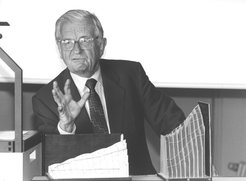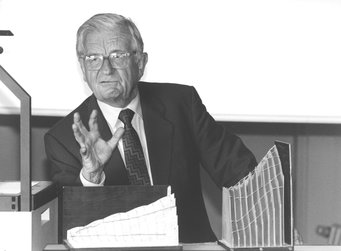Rudolf Kippenhahn (24.5.1926 – 15.11.2020)
Emeritus Scientific Member and former Director of the Max Planck Institute for Astrophysics
Rudolf Kippenhahn, former director of the Max Planck Institute for Astrophysics in Garching, passed away in Göttingen on 15 November 2020 at the age of 94. With his passing, we lose someone whose pioneering scientific achievements not only shaped the field of theoretical astrophysics for many years, but who also helped our institute to develop a very special style of research and scientific exchange.

Rudolf Kippenhahn
In the mid 20th century, the structure and evolution of stars were a major focus of astronomical research. During this time, Rudolf Kippenhahn was one of the pioneers building numerical models of stars, and he established this field in Germany and elsewhere. This, among other things, led to his appointment as director at the Institute for Astrophysics in 1974, which at that time was still part of the Max Planck Institute for Physics and Astrophysics. Before that, he became Scientific Member and Head of the Department of Theoretical Astrophysics in 1963, but then headed the University Observatory in Göttingen from 1965 until his return to the Max Planck Society, where he succeeded Ludwig Biermann.
Together with Alfred Weigert, Emmi Meyer-Hofmeister and later Hans-Christoph Thomas, Rudolf Kippenhahn developed and established a stellar evolution program which became one of the standard programs in this field and was later used in many countries. With the help of this program numerous aspects of the evolution of stars of different masses and developmental phases could be studied and clarified. In addition, Rudolf Kippenhahn developed various methods allowing multidimensional physics effects in stars to be approximated in one-dimensional calculations. These include rotation and thermohaline mixing as well as the evolution of binary stars. These methods are still in use today – basically unchanged. His textbook on the subject, written with Weigert, is a standard in the field.
Even though stars were close to his heart, the Institute for Astrophysics did not become a stellar institute under his leadership. Kippenhahn's wide-ranging interest, his unquenchable curiosity for new discoveries and his deep understanding were also reflected in the diversity of research carried out at the institute. The breadth of theoretical work ranged from comets to the theory of relativity and cosmology, and – under the leadership of Heinz Billing – the institute also housed an experimental department for gravitational wave research.
Under Rudolf Kippenhahn, the institute was established as an internationally recognised centre of numerical-theoretical astrophysics. After his retirement in 1991, he increasingly turned to writing popular science books, for which he was awarded prizes in addition to those for his scientific achievements. Rudolf Kippenhahn was Vice-President of the International Astronomical Union and Chairman of the German Astronomical Society, whose Karl Schwarzschild Medal he received and of which he was appointed honorary member. Among other awards, he received the Eddington Medal of the Royal Astronomical Society and the Order of Merit 1st Class of the Federal Republic of Germany.
Rudolf Kippenhahn managed the institute, which moved to Garching in 1979, with a gentle, liberal hand and with a great deal of humour. It was no coincidence that a room for scientific discussions was called "Forschungsfreiraum". Not only did he value broad theoretical, especially numerically supported research, he also encouraged communication between the individual groups in every respect. The tradition of free theoretical research and scientific dialogue still characterises the institute to this day.
Rudolf Kippenhahn has left his mark not only in theoretical astrophysics. In his institute, he established a unique culture of independent research at the highest level, which still shapes the character of the Max Planck Institute for Astrophysics today. We owe him a great debt, and will honour his memory and this legacy.
Achim Weiss and Volker Springel
